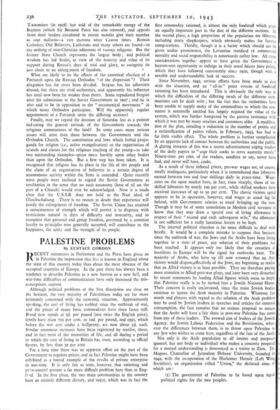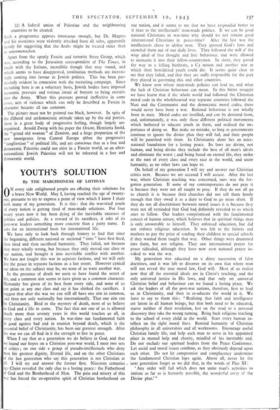PA LESTINE PROBLEMS
By EUSTACE GORDON
RECENT statements in Parliament and the Press have given us in Palestine the impression that less is known in England about the state of this country today than about the most obscure of the occupied countries of Europe. In the past there has always been a tendency to describe Palestine as a new heaven or a new hell, and war-time difficulties of communication have only increased the mis- conceptions current.
Although political problems of the first dimension are clear on the horizon, the vast majority of Palestinians today are far more intimately concerned with the economic situation. Approximately speaking, the cost of living has trebled since the outbreak of war, and the prices of many basic commodities have risen faster still. Bread now stands at 5d. per pound (just twice the English price), lentils have risen 70o per cent. to tod. per pound, and eggs, which before the war cost under a halfpenny, are now about 5d. each. Similar enormous increases have been registered by textiles, shoes, and in fact most of the necessities of life, and all during a period in which the cost of living in Britain has risen, according to official figures, by less than 3o per cent.
For a long time there was no apparent effort on the part of the Government to regulate prices, and in fact Palestine might have been exhibited as a horrid example of the results of private enterprise in war-time. It is only fair to state, however, that rationing and przce-control present a far more difficult problem here than in Eng- land. In the first place, the two main communities in the country have an entirely different dietary, and sugar, which was in fact the first commodity rationed, is almost the only foodstuff which plays an equally important part in the diet of the different sections. In the second place, a high proportion of the population are illiterate, including many shopkeepers, which obviously makes for further complications. Thirdly, though it is a factor which should not be given undue prominence, the Levantine standard of commercial morality and social responsibility is notoriously rather low. All these considerations togethez appear to have given the Government a heaven-sent opportunity to indulge in their usual laisser faire policy, which they have followed consistently since 192o, though with a notable and understandable lack of success.
Since November, 1942, serious efforts have been made to deal with the situation, and an " all-in " point system of foodstuff rationing has been introduced. This is obviously the only way in which the difficulties of the differing needs of the different com- munities can be dealt with ; but the fact that the authorities have been unable to supply many of the commodities to which the con- sumer is nominally entitled has largely negated the value of the system, which was further hampered by the passive resistance with which it was met by many retailers and customers alike. A modifica- tion of the plan, entailing a reduction in the number of points and a reclassification of points values, in February, 1943, has had so far little visible effect. The whole problem is further complicated by an apparent lack of contact between the authorities and the public. A glaring instance of this was a recent advertisement urging readers
of the daily papers to "urge their cooks to serve austerity. meals." Ninety-nine per cent. of the readers, needless to say, never have had, and never will have, cooks.
As a result of these inflated prices, prc-war wages are, of course, totally inadequate, particularly when it is remembered that labourers earned between two and four shillings daily in peace-time. Wage-
rates on the open market -have, in fact, risen sharply, those of 'un- skilled labourers by nearly too per cent., while skilled workers have
received increases of up to 5o per cent. The classic vicious spiral appears to be in operation, however, and wages as usual lag far behind, with Government salaries as usual bringing up the rear.
Though it may be of some consolation to Moslem civil servants to know that they may draw a special cost of living allowance in respect of their " second and each subsequent wife," the allowance is not sufficient for a really luxurious harem to be kept.
The internal political situation is far more difficult to deal with briefly. It would be a complete mistake to suppose that because, since the outbreak of war, the Jews and the Arabs have been living together in a state of peace, any solution of their problems has been reached. It appears only too likely that the cessation of hostilities in Europe will be the signal for outbreaks here. The majority of Arabs, who have up till now assumed that an Axis victory would disposeieffectively of the Jews, are beginning to realise that an Allied victory is at least possible. They are therefore paying more attention to Allied post-war plans, and 'nave been very disturbed by recent statements by leading Allied figures which seem to imply that Palestine really is to be turned into a Jewish National Home.
Their concern is easily understood, since the main Jewish bodies continue to ignore the Arab majority in Palestine. Whatever fair words and phrases with regard to the solution of the Arab problem may be used by Jewish leaders in speeches and articles for external consumption, the fact remains that no serious proposal to ensure that the Arabs will have a fair share in post-war Palestine has come
from any of these leaders. The avowed aim of leaders of the Jewish Agency, the Jewish Labour Federation and the Revisionists, what- ever the differences between them, is to throw open Palestine to 1 any Jew who wishes to come here, regardless of the fate of the Arab. t
Not only is the Arab population to all intents and purposes ignored, but any body or individual who makes a concrete proposal for a mutual understanding is denounced as a traitor to Zion. Dr. Magnes, Chancellor of Jerusalem Hebrew University, founded //1 1942, with the co-operation of the Hashorner Hatzair (Left Wing c Socialists), an organisation called "Union," the declared aims of a which are: a (s) The government of Palestine to be based upon equal ° political rights for the two peoples.
(2) A federal union of Palestine and the neighbouring countries to be created.
Such a programme appears innocuous enough, but Dr. Magnes and his associates were violently attacked from all sides, apparently mainly for suggesting that the Arabs might be treated other than as untermenschen.
Apart from the openly Fascist and terrorist Stern Group, which was, according to the Jerusalem correspondent of The Times, in touch with the Italians, incredible though that may sound, and which seems to have disappeared, totalitarian methods are increas- ingly coming into favour in Jewish politics. This has been par- ticularly evident In connexion with the recruiting campaign. Since recruiting here is on a voluntary basis, Jewish bodies have imposed economic pressure and various formi of boycott to bring recruits into the Army. When this pressure proved ineffective in some cases, acts of violence which can only be described as Fascist in character became all too common.
The picture must not be painted too black, however. In spite of the illiberal and undemocratic attitude taken up by the old parties, there is a great body of progressive feeling, though largely un- organised. Arnold Zweig with his paper the Orient, Henrietta Szold, the " grand old woman " of Zionism, and a large proportion of the new immigrants• from Central Europe abhor the progressive "junglisation " of political life, and are conscious that as a free and democratic Palestine could not exist in a Fascist world, so an ultra- nationalistic Jewish Palestine will not be tolerated in a free and democratic world.



























 Previous page
Previous page